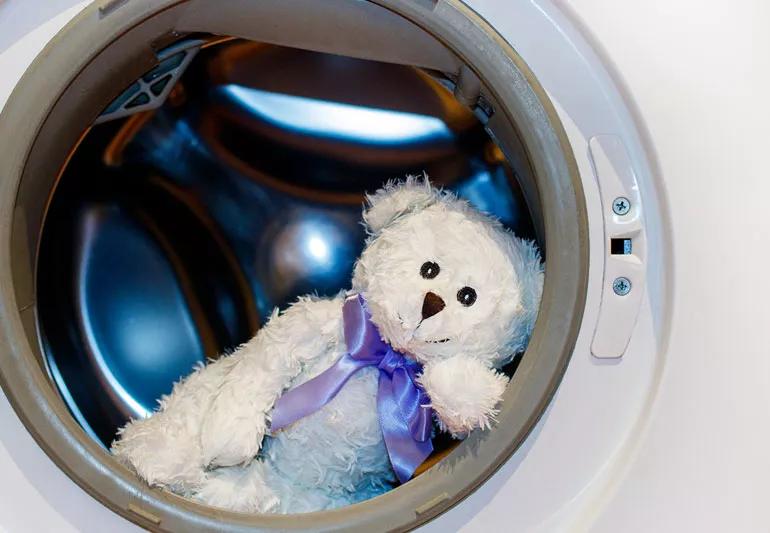Surprisingly simple bedroom changes that work

Image content: This image is available to view online.
View image online (https://assets.clevelandclinic.org/transform/56c2b319-88bf-4197-9683-471673c96c3a/protectNighttimeAllergies-976132308-770x553-1_jpg)
Washing stuffed toys to provide allergy relief
If allergy symptoms disturb your sleep at night, some simple changes to your sleeping environment might help you find relief, says allergist and immunologist Sandra Hong, MD.
Advertisement
Cleveland Clinic is a non-profit academic medical center. Advertising on our site helps support our mission. We do not endorse non-Cleveland Clinic products or services. Policy
It’s important to pay special attention to keeping your sleeping space clean and free from allergens. While these changes are great for everyone, they’re particularly useful for people who are allergic to dust mites, mold, pollen or pet dander.
“If you have allergies, your bedroom needs to be as dust- and clutter-free as possible,” says Dr. Hong. And she has a robust list of ways you can achieve this cleaner sleeping environment.
These tips and tricks should help you cut down on allergens and get better rest.
To keep dust mites at bay, use zippered covers for your pillow, mattress and box springs. “For bedding, you need something you can wash and dry in high heat,” Dr. Hong says. “And no feathers. Trade out feather pillows and down comforters for bedding made with synthetic materials.”
If possible, avoid carpet in your bedroom or change out for hard floors. Dust mites and other allergens can get trapped in the fiber of the carpet whereas with hard floors, a damp mop can trap dust particles that settle.
Use blinds rather than curtains to cover windows since heavy draperies and upholstered curtains collect dust.
For kids, stuffed animals are a commonly overlooked breeding ground for dust mites. “Stuffed animals need to be washed weekly in hot water and dried on a high heat setting at least once a week,” says Dr. Hong. “If they can’t be washed should be sealed in plastic bags and left in the freezer overnight.” High heat and extreme cold will kill dust mites living deep inside a plush toy’s stuffing.
Advertisement
These are a bad idea for allergy sufferers because dust collects on top of ceiling fans, Dr. Hong says. “Then when you turn on the fan, it whips dust around the room.”
Dust mites thrive in a humid environment, so try to maintain 50 percent humidity or less in your bedroom. Use a dehumidifier and keep windows closed.
If you use a window air conditioning unit, make sure it is set to recirculate inside air, rather than pulling moist air from outside. This can help people with seasonal allergies as well. But, cautions Dr. Hong, air conditioning units can harbor mold. People with mold allergies, in particular, should make sure their window air conditioning units are cleaned thoroughly on a regular basis.
“Getting a HEPA filter for the bedroom may help quite a bit,” Dr. Hong suggests. These small, portable units trap allergens like dust mites, pet dander and pollen. If you choose a different type of air filter or air purifier, make sure it is one that does not produce ozone, which worsens asthma symptoms.
Dr. Hong says, although your pets may be members of the family, they need their own sleeping space. “I’m always surprised at the number of allergy sufferers who allow pets in their bedrooms,” she says. “Hamsters, guinea pigs, mice and other pets should not be living in a person’s bedroom, and you shouldn’t allow cats and dogs to sleep on your bed. That will cut down on the amount of pet dander in the air.”
One more way to keep your bedroom allergen-free (or as close as possible) is to take a shower before bed and leave your dirty clothes outside your bedroom. This helps limit the amount of dirt, pollen, pet dander or other allergens you might carry into the bedroom with you before slumber.
“Using medications properly can make all the difference in the world,” says Dr. Hong. “Antihistamines help with itching and sneezing, but alone do nothing to help the congestion that keeps you up at night.” Decongestants are the “D” part in allergy medications like Allegra-D®, but they can have a stimulant effect that disrupts sleep in some people.
The best choice for allergy relief and restful sleep are prescription nasal steroids — sold as brands like Flonase® and Nasonex®. While it may be tempting on sleepless nights to use a prescription or over-the-counter sleep aid, Dr. Hong never recommends their use, especially for her patients with allergies.
“If your medications aren’t working, make sure you see your health care provider,” Dr. Hong says. “There are other options we can try,” she adds.
Advertisement

Delivered every Tuesday!
Sign up for our Health Essentials emails for expert guidance on nutrition, fitness, sleep, skin care and more
Learn more about our editorial process.
Advertisement
Infections like sinusitis, colds, flu and COVID-19 can cause a fever, but allergies aren’t infections
Reduce the impact of seasonal sniffles by starting your medications ahead of time
It can help reduce exposure to allergens, but don't expect it to solve allergy or asthma issues
Allergies can pop up at any time in your life
A natural approach may help resolve that sneezing and runny nose
An allergist explains this uncommon but unsettling symptom
Foods like hot peppers, garlic and ginger can trigger a leaky reaction
Find out if the perfect pooch truly exists from an allergist
Type 2 diabetes isn’t inevitable with these dietary changes
Applying a hot or cold compress can help with pain
Pump up your iron intake with foods like tuna, tofu and turkey